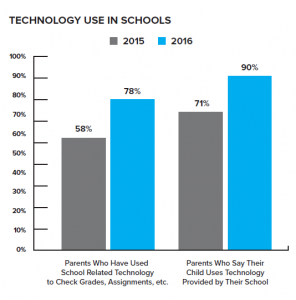New Survey Finds Parents Support School Tech and Data, But Want Privacy Assurances
FOR IMMEDIATE RELEASE
December 8, 2016
Contact: Melanie Bates, Director of Communications, [email protected]
New Survey Finds Parents Support School Tech and Data, But Want Privacy Assurances
Washington, DC – Today, the Future of Privacy Forum (FPF) released a new survey, Beyond One Classroom: Parental Support for Technology and Data Use in Schools. The survey asked parents to comprehensively outline their goals and concerns about the use of technology and student data. Their answers, and the conclusions that can be drawn from them, should inform the debate regarding local, state, and national policies concerning K-12 education and data use.
Beyond One Classroom follows FPF’s 2015 survey, which showed that parents were generally aware of and understood the technology used in their children’s schools, but lacked knowledge of many of the specific laws and practices that provide guidelines and important protections for children’s information.
“Parents are the strongest advocates for their children’s educational success, and all other stakeholders in the educational system should embrace the opportunity to communicate and work with parents as partners in addressing these issues,” said Amelia Vance, FPF Policy Counsel.
The survey found the rates of technology use in schools – both by students and parents – went up by 20% since 2015 (see below graph). Not only are students using more technology provided by schools, but more parents are using school-related technology to supervise their child’s education process, and to communicate with the school.
The key findings of Beyond One Classroom indicate that the closer the use of data is to individual classrooms and to the parent’s child, the more strongly parents support, and desire, the benefits of student data collection and use. According to most parents, the most convincing reasons to use individual student information are to:
- Identify students who are struggling so that schools can provide appropriate support earlier (85%);
- Personalize the learning process by identifying the strengths and weaknesses of individual students (82%); and
- Help schools build profiles on individual students, such as those used to predict best fits for future vocations or professions (57%).
The results point out that as data use becomes less directly tied to students, parents still want to comprehend the benefit to the classroom. Moreover, parents support research that can be used in a school or classroom to directly benefit students.
“Communicating and demonstrating these additional benefits to parents is key to establishing and maintaining trust in an ongoing relationship between parents, their communities, and the schools and vendors that serve them,” Vance said.
The findings also illustrated that parents may be seeing the value school districts gain from the use of traditionally “sensitive” information. Support for the collection and use of parents’ marital status, family income, and social security numbers all increased significantly:
- parental marital status — 45%, up 8%,
- family income — 37%, up 10%, and
- Social Security numbers — 35%, up 11%.
Over half of parents of school age children now agree that race and ethnicity are data that is appropriate for collection and use by schools.
“The use of this type of data, appropriately controlled and protected, is critical for research that identifies potentially discriminatory policies and practices, and it is heartening to see that parents appreciate the value that this data can provide when it is used responsibly,” Vance said.
“Overall, 2016 showed the increasing prevalence of technology use by both parents and students, increasing levels of support by parents of the appropriate collection and use of data by schools, and continued strong belief in the possibilities of technology to improve their child’s educational opportunities,” said Brenda Leong, FPF’s Senior Counsel and Director of Operations. “The goals for educators, advocates, and policymakers remain to communicate policies clearly; establish transparent practices; and work with parents as key partners in the educational system to achieve the best learning outcomes for our children.”
Beyond One Classroom was produced with funding provided from the Bill & Melinda Gates Foundation.
###
The Future of Privacy Forum (FPF) is a non-profit organization that serves as a catalyst for privacy leadership and scholarship, advancing principled data practices in support of emerging technologies. Learn more about FPF by visiting www.fpf.org.




